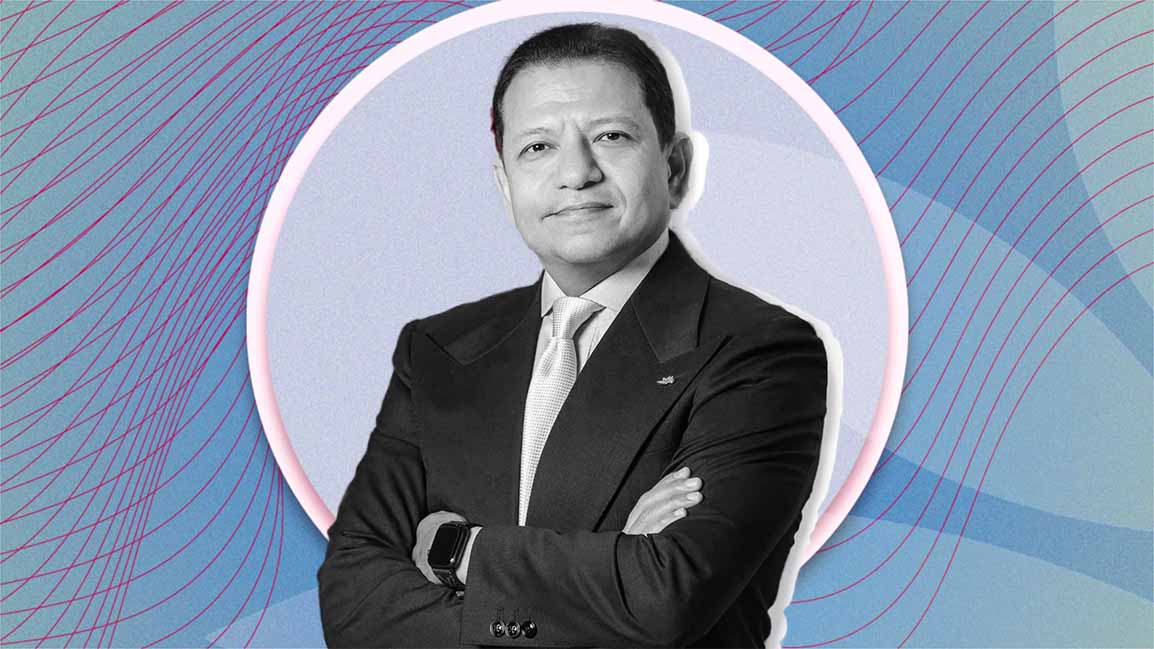- | 10:30 am
What is the most critical metric for digital banks? Hear from Ahmed Abdelaal
The Mashreq Group CEO discusses the big tech impacting the banking industry, the next phase of digital evolution, and how banks can help customers become inflation-resilient.

Inflation is hitting a new high in the Middle East and North Africa (MENA) region, and policymakers are working feverishly to tame it — perhaps even risking recession.
With inflation in the MENA region forecast to remain elevated at an annual average of 14%, as international food and energy prices rise, Ahmed Abdelaal, Group CEO of Mashreq, says there’s a “shift in consumer behavior trends” to counter inflation, but the banking industry can be “valuable partners by offering financial advice and tools to customers to better manage their money.”
“Consumers are looking for cheaper options, shopping at retailers offering discounted rates, reducing the frequency of dining out and eating more at home,” says Abdelaal.
“By harnessing the power of data, banks can offer personalized guidance to customers to make informed financial decisions and build resilience that will protect them from the pressures of inflation.”
Like all businesses, banks are struggling to keep the lights on, ensure business continuity, and meet the changing ways customers want to engage post-pandemic. While previous crises cast the banks as part of the problem-–this time, they are part of the solution.
Banks that have embraced modern banking technology can fare better in meeting the new challenges. Inherently tech-centric, Abdelaal understands the importance of staying ahead of the curve on technology and being at the forefront of digital transformation.
While the pandemic has accelerated the need for modern banking technology, it didn’t create it. The 2020s were already being framed as the decade for digital in the banking industry. Providing seamless digital customer experiences was, therefore, already a “must.”
INVESTING IN DIGITAL INNOVATION
Mashreq has moved to service its customers and quickly adapted its products. Over the last few years, the bank has invested in digital innovation, particularly data analytics, AI, and robotics, to automate processes. “Leveraging these technologies gives us an advantage in adapting to future disruptions,” he says.
“AI is a key driver of our digital transformation, underpinning our product and service development and customer experience across every touchpoint and platform.”
Mashreq NEO recently became the first digital platform in the UAE to use facial recognition for bank account openings. Through innovation and investments in digitization, Abdelaal says the aim is to improve the banking experience for customers while maintaining security and data privacy.
He points out that delivering a high level of personalization requires a close alignment of strategy and technology. “Technologies such as machine learning, big data, and open banking are set to become essential building blocks for smarter digital services and will create a more personalized experience.”
These technologies will also allow for the evolution of non-banking services, such as insurance. Mashreq has invested in unified insurance platforms to create personalized products for its customers. “We’re building a customer-centric model using technology and digital tools to provide choice and opportunity,” he says.
Asked what digital success is for Mashreq, Abdelaal says, “The most important metric for digital success is the customer experience.”
To get there, the bank is investing and collaborating with innovative fintech developers, and upgrading its business systems. “We were the first bank in the Middle East to launch a KYC platform underpinned by blockchain.”
Its next digital journey, Abdelaal says, is predicated on understanding what purpose banks serve in today’s economic model. “It is no longer about digital strategy but a strategy for a digital world.”
“Digital access is not a luxury anymore; it must be hardwired in the DNA of everything we do. As a business, we can go nowhere if we are not rooted in the digital ecosystem–-that’s where we are and where we have to stay,” he adds.
“We must keep up with the new technologies and be constantly alert to potential new partnerships.”
FINTECH COLLABORATION
Meanwhile, banks and fintech have grown interdependent, making it difficult for one to function without the other. “Our customer-centric approach drives our partnerships and investments in fintech. Bank and fintech partnerships are paving the way for the future of financial services.
Mashreq works with a number of fintech companies in the retail space in payments, wealth management, credit underwriting, and KYC – it views them as “strategic partners.” It partnered with fintech enablers such as Fintech Hive, Hub 71, and Startupbootcamp and invested in platforms such as NymCard, Cashew, and Touche.
While consumers increasingly turn to fintech solutions and big tech platforms, fragmenting existing relationships for essential financial services, such as deposits, loans, payments, and investments, what’s the next big tech in the banking industry?
“Blockchain is a historic game changer. APIs are also fundamental in reshaping the purpose and function of finance and improving the customer experience – both Mashreq has embraced,” he says.
Listing his priorities in the next two years, Abdelaal, who became Mashreq Group CEO in 2019, says the future of banking will be about creating innovative experiences, not products. “To stand out in the crowded market and foster loyalty among clients and consumers, banks must connect with a wide spectrum of audiences through partnerships in various segments, such as sports, entertainment, gaming, and be present where consumers are.”
The Mashreq CEO expects positive business momentum to continue on the back of client optimism and interest rate hikes, even as the regional economy grapples with inflationary pressures.
“The UAE’s economy will accelerate due to higher oil prices, supportive government policies, and steadily growing non-oil activity. We expect the banking sector to benefit from the interest rate hikes, assuming banks adopt a pragmatic approach,” says Abdelaal. “The sector is also buoyed by good liquidity conditions and modest loan growth, benefiting the banking industry.”







































